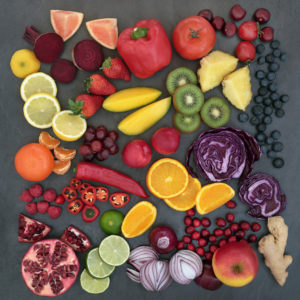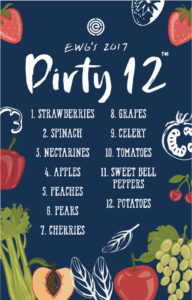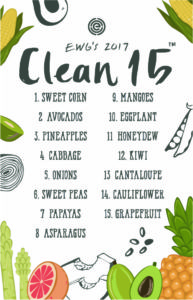The Dirty Dozen: Why Organic is Best
By Olivia Nugroho, RN, BSN

Are you someone who enjoys a smoothie in the morning? If you are, that is great!
We all know that fruits and vegetables are among the healthiest foods that should be consumed daily. FDA recommends adults and children consume at least two servings of fruits and three servings of vegetables daily. However, vegetables and fruits are also among the foods that can be contaminated easily by toxic chemicals widely known as pesticides. Pesticides are used to kill insects or any living organisms that are considered pests and found commonly in conventional crops. Pesticides are toxic to the human body and have been linked to a variety of health problems such as cancer, hormone disruption, and neurotoxicity. Although buying organic produce is preferable, it may not always be accessible or affordable.
The Environmental Working Group (EWG) has created lists called the “Dirty Dozen” and the “Clean 15”, to help you decide which vegetables and fruits to buy organic and which ones are safe to purchase as conventionally grown. The “Dirty Dozen” contains fruits and vegetables that have the most pesticide residue when they are bought as conventional produce. The “Clean 15” contains produce that are deemed safe to buy as non-organic because they have much less pesticide residue.
EWG’s Dirty Dozen List (Buy These Organic)
- Strawberries

- Apples
- Nectarines
- Peaches
- Celery
- Grapes
- Cherries
- Spinach
- Tomatoes
- Sweet bell peppers
- Cherry tomatoes
- Cucumbers
EWG’s Clean 15 List (OK to Buy These Conventional)
- Avocados

- Sweet corn
- Pineapples
- Cabbage
- Sweet peas (frozen)
- Onions
- Asparagus
- Mangos
- Papayas
- Kiwifruit
- Eggplant
- Honeydew melon
- Grapefruit
- Cantaloupe
- Cauliflower
By eating organic produce, we lower our exposure to pesticide and also support environmentally friendly farming practices that help protect the earth from the harm of environmental toxins. It is also highly recommended that you wash all vegetables and fruits prior to consuming, especially when you buy conventional produce. Conventional fruits and vegetables are often waxed after harvest to protect them from many hands that touch them on their journey from farm to market. Washing produce with clean water only removes visible dirt on the surface, but it does not remove the wax on its surface. It is recommended that you wash your vegetables and fruits with white vinegar and water. White vinegar and water help remove wax and therefore also help remove pesticides that sit on the surface of produce. Although peeling off skin may help to get rid of pesticides, it is not recommended since skin often has the most nutrients. The FDA lists a few tips on how to properly prepare your produce to protect yourself from the exposure to pesticide.
- Wash your hands for 20 seconds with warm water and soap before and after preparing fresh produce
- Cut away any damaged or bruised areas
- Gently rub produce while holding it under plain running water
- Wash produce before you peel it
- Use a clean vegetable brush to scrub firm produce
- Dry produce with clean cloth or paper towel
- Throw away the outermost leaves of lettuce or cabbage
 Even though eating organic is the best, eating non-organic produce is still better than not eating fruits or vegetables at all. If you have limited access to organic fruit and vegetables, try using the Dirty Dozen and Clean 15 lists to make your purchase decision. The more you buy organic produce, the better. Dr. Mercola said, “The largest study of its kind found that people who ‘often or always’ ate organic food had about 65 percent lower levels of pesticide residues compared to those who ate the least amount of organic produce.” He also recommends consuming a lot of fermented foods such as kimchi if you think you have been exposed to pesticides. The lactic acid bacteria, that are formed during the fermentation process, help break down pesticides and detox your body.
Even though eating organic is the best, eating non-organic produce is still better than not eating fruits or vegetables at all. If you have limited access to organic fruit and vegetables, try using the Dirty Dozen and Clean 15 lists to make your purchase decision. The more you buy organic produce, the better. Dr. Mercola said, “The largest study of its kind found that people who ‘often or always’ ate organic food had about 65 percent lower levels of pesticide residues compared to those who ate the least amount of organic produce.” He also recommends consuming a lot of fermented foods such as kimchi if you think you have been exposed to pesticides. The lactic acid bacteria, that are formed during the fermentation process, help break down pesticides and detox your body.
Finally, getting your produce from local farmers is always the best way to get the freshest and most nutrient-rich food. You can ask your local farmers about how they grow their produce, whether it is sprayed with pesticides or not. If you do not live close to any local farmers or do not have access to a local farmers’ market, you can try to grow produce yourself in your own backyard using organic methods.
Produce Wash Recipe
Keep a batch of this under in a spray bottle under your sink and use it to wash your produce before consuming. It will remove a lot of the pesticide residue on the outside of your fruits and vegetables!
- 1 teaspoon white vinegar
- 1 teaspoon lemon juice or 5 drops of lemon essential oil
- 8 oz filtered water






